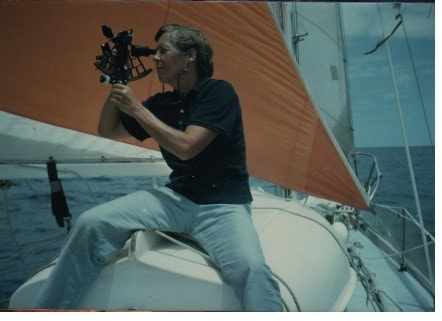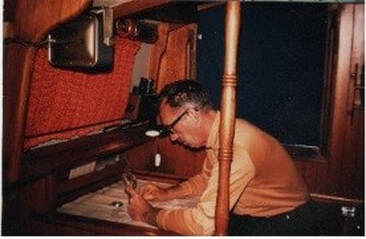THE GOOD LIFE
|
This book narrates the fascinating and sometimes dangerous but always thought-provoking adventures of the good ship Mah-lish. In a lighted-hearted and sometimes laugh-out-loud funny way, we enjoy Don and Esther Brown's odyssey around the South Pacific in the 1970's. The people and places you will meet in these pages will truly enhance your life - from the real Robinson Caruso in the Cook Islands to a gracious matriarch in Tonga and a dog who talks with dolphins. You will go hunting lobsters in the middle of the night on Mopelia and find humour in a terrific gale. Exciting, poignant and always engaging – the read is not merely a voyeurism, you truly become a member of the crew sharing laughter, fear and amazement.
Praise for The Good Life
"Just finished reading THE GOOD LIFE, your book about sailing in the South Pacific in the good ship Mah-lish. What an adventure your parents embarked on in their retirement. I laughed out loud and saw myself and my husband of 56 years in many of the situations they found themselves in. Thanks for reminding us all that it is the little things that matter and life will go on no matter what. Keep on writing." Purchase your copy of The Good Life at any of the following online retailers. |
THE GOOD LIFE
Excerpt
MOPELIA, ILES SOUS LE VENT (the Society Islands)
Excerpt
MOPELIA, ILES SOUS LE VENT (the Society Islands)
A Lantern and a Gunny Sack
The good Ship Mah-liah is now leaving Bora Bora and making for Pago Pago, pronounced pango pango as the “g” on Melanesia sounds like a “ng”, a little fishing port on the island of Upolu in the Samoan Archipelago. The stretch is 1,250 nautical miles to the WNW and the crew plans to make two stops: Mopelia, reported to be a fascinating little place and Suvarov, where, they have heard, lives a real Robinson Crusoe.
Having found Eden, you may wonder why they are leaving Bora Bora at all. Well, it is because it is a full moon. “?” Yes. The full moon is the time of nautical walkabout. It has come too soon and although not anxious to leave, there is lots more places to see and another full moon will not be for another month, so the crew obey the yachty code and set sail.
Is this yachty code superstitious or astrological you may ask. Neither. Actually, the reason is very simple. In the tropics, there is little twilight. The sunset ‘show’ is spectacular, but short. If there is no moon, daylight turns to absolute blackness in a brief twenty minutes. After being in the lights of a village, no matter how small, all sailors go through a cultural shock to being encapsulated ink pitch dark as there launch themselves into deep space. No sky. No earth. Not even the sea. Your small vessel suddenly becomes the loneliest place on earth and isolation feels total. So for the good of morale, if you can acclimatize your forages into the void with the moon shining on the surface, you avoid some of the stress. Consequently, many sailors only begin deep-sea voyages on a full moon.
The good Ship Mah-liah is now leaving Bora Bora and making for Pago Pago, pronounced pango pango as the “g” on Melanesia sounds like a “ng”, a little fishing port on the island of Upolu in the Samoan Archipelago. The stretch is 1,250 nautical miles to the WNW and the crew plans to make two stops: Mopelia, reported to be a fascinating little place and Suvarov, where, they have heard, lives a real Robinson Crusoe.
Having found Eden, you may wonder why they are leaving Bora Bora at all. Well, it is because it is a full moon. “?” Yes. The full moon is the time of nautical walkabout. It has come too soon and although not anxious to leave, there is lots more places to see and another full moon will not be for another month, so the crew obey the yachty code and set sail.
Is this yachty code superstitious or astrological you may ask. Neither. Actually, the reason is very simple. In the tropics, there is little twilight. The sunset ‘show’ is spectacular, but short. If there is no moon, daylight turns to absolute blackness in a brief twenty minutes. After being in the lights of a village, no matter how small, all sailors go through a cultural shock to being encapsulated ink pitch dark as there launch themselves into deep space. No sky. No earth. Not even the sea. Your small vessel suddenly becomes the loneliest place on earth and isolation feels total. So for the good of morale, if you can acclimatize your forages into the void with the moon shining on the surface, you avoid some of the stress. Consequently, many sailors only begin deep-sea voyages on a full moon.
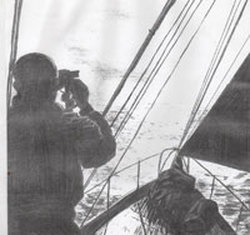
This day, the wind is light to moderate and steady from the SE, as it has been for thousands of years in the latitude of the trade winds. The heavy floral scent follows them out for 20 – 25 miles after the island has disappeared over the horizon.
The sea is flat and the nights so warm, they sleep on deck. The balloon-like jenny is replaced by a smaller working jib on the front. The mizzen sail is taken down completely and the main sail is reefed. They do this so as to travel less quickly in the night and not run the risk of coming within fifteen miles of their destination atoll before daybreak. The evening fix is taken to themselves they will not run into any unseen reef in the night and go to bed with an easy mind, knowing Charlie will look after them.
Most of the time at sea, no difficulties arise if you give or take a little mileage here or there, but when approaching an atoll you have to been accurate. To come upon one at night is sheer folly because you would crash upon the reef before being aware it.
So you make the proper arrangements and go to bed. Good night sleep. Yes? But the ocean is a big wide world and things can happen. A couple did everything they needed. The sightings, fixed their position, assessed speed, made allowances. Would arrive about 10:00 in the morning. All was right. Go to bed. Sleeping peacefully and about 4:00am, baboom, crash, bang. They ran into a reef. What happened? What island? While they snuggly dozed in their bunks, the cat when on a midnight prowl and changed the heading of the vessel. Boat gone. Supplies gone. Possessions gone. End of voyage. But it was OK. They saved the cat.
Atolls cannot even be seen in the daylight for any distance. The tiny coral islets, and there are many dotting the sea, all have their reef barely above the surface. A fetch is a very long travelling, uninterrupted wind pushing up a large swell. When this swell hits n atoll an enormous but fine spray is sent high into the air like a veil over the island. You cannot see this mist well. It doesn’t even feel wet when you are in it. In fact, you could dry your clothes in it. So went any further than six miles away, you see nothing but the endless sea. You can see countless miles out to the sea from the lagoon, but not the reverse. This is certainly an interesting phenomenon, but dangerous, as testified by many wrecks that remain perched on the reefs all over the South Pacific. Caution is definitely the word here.
Having done all the proper things, including in-depth navigational verifications the night before and a sight taking just before dawn, nothing could go wrong. Of course. However, in the morning fix, the Captain, expert at navigation, and altogether too many other things, he thinks, only took two sightings instead of the required three. By the time he plots them in India, it is too late to take another sighting. However, according to the fix the night before, they will spot the atoll in an hour.
At 0705, they scamper put on the deck expecting to gaze upon the breath-taking sight of Mopelia. Instead, they are greeted with a vacant sea!!! The atoll is not there. Take your choice. They have either passed it, have not got there yet or really are in India.
Yes. The navigator blew it. Since the only time to take a fix is just after sunset or just before dawn, they ask, what next? They have already missed their chance to correct the situation, and waiting almost twelve hours to find out where they are, will they have gone too far to go back? Have they missed their opportunity to see Mopelia?
The lowest member of the crew, who also happens to be chief cook, sail repairer, medic, dentist and many other things, is impressed neither with the expensive equipment nor the style of those who look at stars with a mysterious and all-knowing look and insist they have everything under control, and is not in the least surprised. Or overly concerned. She knows they have not overshot it. She stands up on the deck and looks around.
“It’s over there,” she says calmly and points to the west.
Captain Brown stares at first at the sea then stares at his crew.
“Nonsense!”
Some time lapses in silence.
“I haven’t a better idea...Let’s go,” and altered course to the west.
The sea is flat and the nights so warm, they sleep on deck. The balloon-like jenny is replaced by a smaller working jib on the front. The mizzen sail is taken down completely and the main sail is reefed. They do this so as to travel less quickly in the night and not run the risk of coming within fifteen miles of their destination atoll before daybreak. The evening fix is taken to themselves they will not run into any unseen reef in the night and go to bed with an easy mind, knowing Charlie will look after them.
Most of the time at sea, no difficulties arise if you give or take a little mileage here or there, but when approaching an atoll you have to been accurate. To come upon one at night is sheer folly because you would crash upon the reef before being aware it.
So you make the proper arrangements and go to bed. Good night sleep. Yes? But the ocean is a big wide world and things can happen. A couple did everything they needed. The sightings, fixed their position, assessed speed, made allowances. Would arrive about 10:00 in the morning. All was right. Go to bed. Sleeping peacefully and about 4:00am, baboom, crash, bang. They ran into a reef. What happened? What island? While they snuggly dozed in their bunks, the cat when on a midnight prowl and changed the heading of the vessel. Boat gone. Supplies gone. Possessions gone. End of voyage. But it was OK. They saved the cat.
Atolls cannot even be seen in the daylight for any distance. The tiny coral islets, and there are many dotting the sea, all have their reef barely above the surface. A fetch is a very long travelling, uninterrupted wind pushing up a large swell. When this swell hits n atoll an enormous but fine spray is sent high into the air like a veil over the island. You cannot see this mist well. It doesn’t even feel wet when you are in it. In fact, you could dry your clothes in it. So went any further than six miles away, you see nothing but the endless sea. You can see countless miles out to the sea from the lagoon, but not the reverse. This is certainly an interesting phenomenon, but dangerous, as testified by many wrecks that remain perched on the reefs all over the South Pacific. Caution is definitely the word here.
Having done all the proper things, including in-depth navigational verifications the night before and a sight taking just before dawn, nothing could go wrong. Of course. However, in the morning fix, the Captain, expert at navigation, and altogether too many other things, he thinks, only took two sightings instead of the required three. By the time he plots them in India, it is too late to take another sighting. However, according to the fix the night before, they will spot the atoll in an hour.
At 0705, they scamper put on the deck expecting to gaze upon the breath-taking sight of Mopelia. Instead, they are greeted with a vacant sea!!! The atoll is not there. Take your choice. They have either passed it, have not got there yet or really are in India.
Yes. The navigator blew it. Since the only time to take a fix is just after sunset or just before dawn, they ask, what next? They have already missed their chance to correct the situation, and waiting almost twelve hours to find out where they are, will they have gone too far to go back? Have they missed their opportunity to see Mopelia?
The lowest member of the crew, who also happens to be chief cook, sail repairer, medic, dentist and many other things, is impressed neither with the expensive equipment nor the style of those who look at stars with a mysterious and all-knowing look and insist they have everything under control, and is not in the least surprised. Or overly concerned. She knows they have not overshot it. She stands up on the deck and looks around.
“It’s over there,” she says calmly and points to the west.
Captain Brown stares at first at the sea then stares at his crew.
“Nonsense!”
Some time lapses in silence.
“I haven’t a better idea...Let’s go,” and altered course to the west.
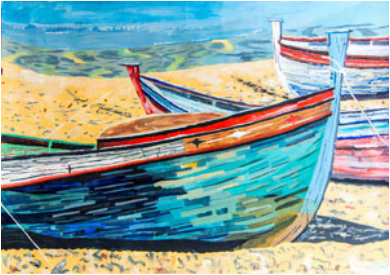
Superior intuition put Mopelia exactly where Esther said it would be. This ability to navigated blind in the middle or and ocean from a woman who could not find here way across the street on land is beginning to irk the Captain.
Definitely, though, Mopelia is not an easy find. This island does not exist at all above its reef. No volcano. Not even a little hillock.
Coming upon an atoll, as always, begins as a slight haze. You have to bee looking straight at it to see it. The haze becomes more distinct and in a few minutes they are looking at one more of the stunning sights of the world.
As with finding an atoll, one must approach with even more precision and attention to detail and procedure. It is the reef that provides this excitement. The fetch presses up against the coral blockade with terrific force sending volumes of water over and into the lagoon. This water has to exit. So somewhere on the leeward side this water creates and maintains a gap. This gap is the only place a boat can enter or exit. The lagoon, itself is calm while just outside the gap there is a maelstrom of currents. On some islands a boat may need its engine on full to get through.
This gap is also a place to visit sharks. At with all atoll, Mopelia’s entrance is alive with fish, so the sharks consider it, quite rightly, a lunch wagon. The sharks are strong enough swimmers to remain stationary and scoop up the little fish as they wash out of the lagoon. Some larger atolls boast of a permanent residency of fifty to sixty well-known beasties. Native-like to stand on the reef and hang their lines into the seething gap. Shark will happily bite fish already caught. The Mah-lish crew has seen fishermen kicking an interloper with his bare feet trying to win lunch.
The good ship follows the reef around to the north side of the island, keeping a very intense eye on the bubbling white foam that marks the edge. This is a pretty safe maneuver if the reef is kept 50 to 60 feet off to the side. Any farther, they might not see the gap. Any less, they are in danger of being sucked into the mass of coral. Suddenly there is an absence of white.
“There it is!” they both yell.
When the boat is exactly 90% to the gap, they turn. It is not time for hesitation. This is another time a sailor realizes that the omnipotent sea calls all the shots. The supplicant must time the turn with deadly accuracy because once they have made it, the boat is committed to the currents. There is no second chance; no possibility of correction. However, once you know the procedure it should be fine. So, if you are not drunk of stupid, it is not a dangerous maneuver. Unless, of course, there is a stray current that you cannot possibly be aware of. Big thrill, getting into the atolls! Engines full on, the Mah-lish struggles to get beyond the barrier. This gap is so narrow the crew sucks in their sides, peering nervously from side to side as the jagged coral is but feet away. Suddenly, they pop through and peace and calm envelop them.
Definitely, though, Mopelia is not an easy find. This island does not exist at all above its reef. No volcano. Not even a little hillock.
Coming upon an atoll, as always, begins as a slight haze. You have to bee looking straight at it to see it. The haze becomes more distinct and in a few minutes they are looking at one more of the stunning sights of the world.
As with finding an atoll, one must approach with even more precision and attention to detail and procedure. It is the reef that provides this excitement. The fetch presses up against the coral blockade with terrific force sending volumes of water over and into the lagoon. This water has to exit. So somewhere on the leeward side this water creates and maintains a gap. This gap is the only place a boat can enter or exit. The lagoon, itself is calm while just outside the gap there is a maelstrom of currents. On some islands a boat may need its engine on full to get through.
This gap is also a place to visit sharks. At with all atoll, Mopelia’s entrance is alive with fish, so the sharks consider it, quite rightly, a lunch wagon. The sharks are strong enough swimmers to remain stationary and scoop up the little fish as they wash out of the lagoon. Some larger atolls boast of a permanent residency of fifty to sixty well-known beasties. Native-like to stand on the reef and hang their lines into the seething gap. Shark will happily bite fish already caught. The Mah-lish crew has seen fishermen kicking an interloper with his bare feet trying to win lunch.
The good ship follows the reef around to the north side of the island, keeping a very intense eye on the bubbling white foam that marks the edge. This is a pretty safe maneuver if the reef is kept 50 to 60 feet off to the side. Any farther, they might not see the gap. Any less, they are in danger of being sucked into the mass of coral. Suddenly there is an absence of white.
“There it is!” they both yell.
When the boat is exactly 90% to the gap, they turn. It is not time for hesitation. This is another time a sailor realizes that the omnipotent sea calls all the shots. The supplicant must time the turn with deadly accuracy because once they have made it, the boat is committed to the currents. There is no second chance; no possibility of correction. However, once you know the procedure it should be fine. So, if you are not drunk of stupid, it is not a dangerous maneuver. Unless, of course, there is a stray current that you cannot possibly be aware of. Big thrill, getting into the atolls! Engines full on, the Mah-lish struggles to get beyond the barrier. This gap is so narrow the crew sucks in their sides, peering nervously from side to side as the jagged coral is but feet away. Suddenly, they pop through and peace and calm envelop them.
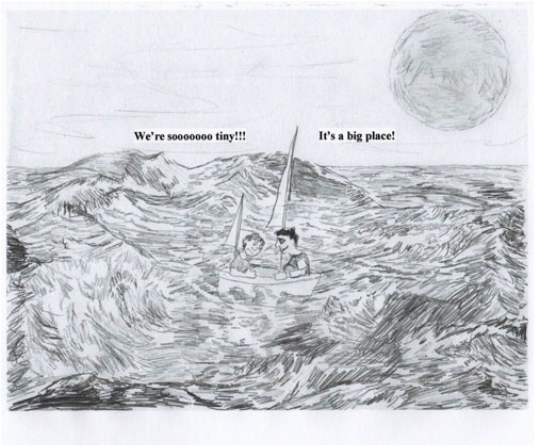
The island, itself, is no bigger than a small pasture. Its highest point reaches no more than four feet. A forest of plan trees kept the dirt stable and if it wasn’t for the reef, the place would have been washed away eons ago.
This is indeed a tiny bit of habitation. A radio transmitting and receiving station on the island is run by a woman and her husband. There are two men, with wives, making a living harvesting copra, which is abundantly supplied, and a teenage son and a handful of small children. One of the men, Mr. Tii, had come from Bora Bora, where he had been employed by the US army during the war. The Americans had occupied Bora Bora, he could explain easily because of the English he had learned from the soldiers because they feared the Japanese wanted Bora Bora for its strategic position. His English was excellent with a charming accent.
“Let me axe you something,” he would repeat.
One of the men’s wives was away when the Mah-lish made landfall. She had had to go to a dentist – a three-month journey! The dentist lived on Bora Bora but the supply ship that collects their copra and delivers supplies to the inhabitants only comes every three months.
Wonderful, open, friendly people, with a genuine sense of sharing. This is getting to be routine. The crew of the Mah-lish have always found the people so. However, they have come across other yachties who have not found the natives friendly. Hmmmmmm. I wonder why that is? The people include Don and Esther in everything and whatever the activity is, they have thoroughly enjoyed both the people and the experience. This bears some deep thinking.
On Mopelia, The Captain is invited to go lobster hunting. As with all things, the island people have their own way of doing things, most often proving simple and effective. The Mopelian way of hunting lobster is with a lantern and a gunny sack.
It is very dark and with all wearing those invaluable coral creepers, the men march out along the reef. A lantern shows the way? No. The teenager at the back of the hunting party has it and seems to be swinging it in some sort of playful entertainment. This is a bit disconcerting for the Captain. He is unfamiliar with walking on a reef, especially doing it in the dark and is generally unskilled, but nonetheless game for the challenge. So what is the lantern for? It is to see the lobsters beautiful, brown eyes glistening under the water in reflection. When humans approach, the lobsters back into crevasses and cannot be seen even in daylight. Ingenious and so simple. It works well for people finding food for their families (but don’t tell commercial fishermen). When one is spotted our native friend reaches down with his gloved hand, pulls it out and deposits it in the gunny sack so coolly slung over the Captain’s shoulder who had so eagerly offered to help in the expedition. Once inside the sack, the lobster naturally tries to bite its way free. Lobster claws can bite through sacks, shorts, and underwear in one go.
Three or four hours are productively spent on the reef when they call it a night. The Captain has learned many skills and hastily retires to his boat while the natives light a fire and spend most of the night cooking the catch and singing. In the morning, they present the crew with an enormous amount of cleaned meat to take on their journey. Being they type of sailors who love to face hardship, the Mah-lish possesses a freezer. They could continue the sweet feasting for weeks.
One other present they were offered is a pet turtle about twelve inches in diameter. Unfortunately, there is no place to keep a turtle on a sailing vessel that would be safe enough for him. Unfortunately, because Mr. Tii really wanted to give his new friends something.
“Keep it under the bed.”
“There is no ‘under the bed on a boat’.”
“Keep it under the sink.”
“The turtle is bigger than the sink.”
Esther gives him some brownies. She hated to disappoint him, but a pet turtle is simply not do-able.
This is indeed a tiny bit of habitation. A radio transmitting and receiving station on the island is run by a woman and her husband. There are two men, with wives, making a living harvesting copra, which is abundantly supplied, and a teenage son and a handful of small children. One of the men, Mr. Tii, had come from Bora Bora, where he had been employed by the US army during the war. The Americans had occupied Bora Bora, he could explain easily because of the English he had learned from the soldiers because they feared the Japanese wanted Bora Bora for its strategic position. His English was excellent with a charming accent.
“Let me axe you something,” he would repeat.
One of the men’s wives was away when the Mah-lish made landfall. She had had to go to a dentist – a three-month journey! The dentist lived on Bora Bora but the supply ship that collects their copra and delivers supplies to the inhabitants only comes every three months.
Wonderful, open, friendly people, with a genuine sense of sharing. This is getting to be routine. The crew of the Mah-lish have always found the people so. However, they have come across other yachties who have not found the natives friendly. Hmmmmmm. I wonder why that is? The people include Don and Esther in everything and whatever the activity is, they have thoroughly enjoyed both the people and the experience. This bears some deep thinking.
On Mopelia, The Captain is invited to go lobster hunting. As with all things, the island people have their own way of doing things, most often proving simple and effective. The Mopelian way of hunting lobster is with a lantern and a gunny sack.
It is very dark and with all wearing those invaluable coral creepers, the men march out along the reef. A lantern shows the way? No. The teenager at the back of the hunting party has it and seems to be swinging it in some sort of playful entertainment. This is a bit disconcerting for the Captain. He is unfamiliar with walking on a reef, especially doing it in the dark and is generally unskilled, but nonetheless game for the challenge. So what is the lantern for? It is to see the lobsters beautiful, brown eyes glistening under the water in reflection. When humans approach, the lobsters back into crevasses and cannot be seen even in daylight. Ingenious and so simple. It works well for people finding food for their families (but don’t tell commercial fishermen). When one is spotted our native friend reaches down with his gloved hand, pulls it out and deposits it in the gunny sack so coolly slung over the Captain’s shoulder who had so eagerly offered to help in the expedition. Once inside the sack, the lobster naturally tries to bite its way free. Lobster claws can bite through sacks, shorts, and underwear in one go.
Three or four hours are productively spent on the reef when they call it a night. The Captain has learned many skills and hastily retires to his boat while the natives light a fire and spend most of the night cooking the catch and singing. In the morning, they present the crew with an enormous amount of cleaned meat to take on their journey. Being they type of sailors who love to face hardship, the Mah-lish possesses a freezer. They could continue the sweet feasting for weeks.
One other present they were offered is a pet turtle about twelve inches in diameter. Unfortunately, there is no place to keep a turtle on a sailing vessel that would be safe enough for him. Unfortunately, because Mr. Tii really wanted to give his new friends something.
“Keep it under the bed.”
“There is no ‘under the bed on a boat’.”
“Keep it under the sink.”
“The turtle is bigger than the sink.”
Esther gives him some brownies. She hated to disappoint him, but a pet turtle is simply not do-able.

